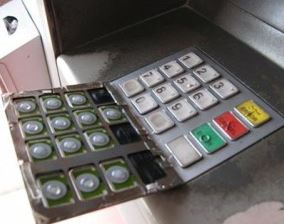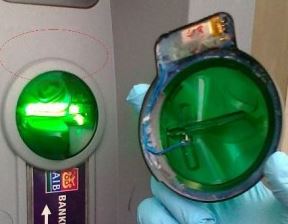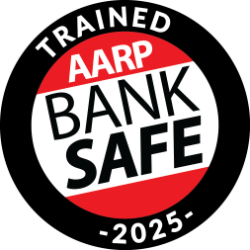Cyber-criminals continually threaten and change the way they try to capture important and personal member information. Our staff is diligently providing resources and up-to-date information to help you keep you and your family safe.
- You may receive a call from , or on our behalf, to verify transaction activity on your card. Please be advised that we will never ask for your card number, pin number, or the three-digit code on the back of your card. You are covered by Visa's Zero Liability protection against fraudulent transactions (does not apply to ATM transactions, PIN transactions not processed by Visa, and certain business card transactions).
- When traveling and you are going to be using your debit or credit card, please give us a call so we can make a note on your account. This will help decrease the likelihood that your card will get blocked as you travel.
- If your Bangor Federal debit or credit card gets lost or stolen, contact us immediately to limit your liability. See more information on how to report your lost or stolen debit or credit card after hours.
Online Banking and Mobile Banking Username and Password Security
We use multi-factor authentication (MFA) on your Online Banking to help protect your accounts from fraud. In addition to MFA, we’ve included other ways below to protect your account(s) from fraudulent activity and cyber-attacks.
- Keep your usernames and passwords private and unique to you. Store these in a secure place that is only accessible by you. Use complex, hard to guess passwords for online services such as Online Banking. Complex passwords are at least 8 characters in length, a combination of upper and lower-case letters, numbers, and special characters.
- Do not allow anyone remote access to your PC.
- Avoid using birth dates, anniversaries, family member’s or pet’s names, or words out of the dictionary as passwords.
- When selecting usernames and passwords for multiple sites, keep them unique and individual. It’s never a good idea to use the same sequence on numerous sites. Should your username/password become compromised, cyber criminals are then able to gain access to other sites you have accessed.
- Public computers are best for basic web-surfing NOT to conduct financial activity such as account inquiries or purchasing items where you would enter your debit or credit card number. Public computers can be infected with viruses and malware capable of capturing your log in information.
- Never leave your computer unattended while you are logged on to a website, always be sure to log off and not just close the browser.
- Use discretion when posting personal information on social media. This information is a treasure-trove to scammers who will use it to feign trustworthiness.
- Use extreme caution when opening emails from unknown sources, especially when opening attachments in emails as the attachment or email may contain viruses or malware.
- Run updated anti-virus and anti-spyware software on your computer and mobile devices. Be sure to keep the software updated so you have the latest protection available.
- Make sure to install any available operating system patches regularly, and do not use computers with operating systems that are no longer supported (such as Windows XP, Windows 7).
- Install and utilize third-party applications and software that you really need. Make sure it is from the vendor such as the Google Play, Apple, or Windows Store. Since the app stores allow third-parties to post and sell apps, make sure the app is from a trustworthy source.
- Review a copy of your credit report annually to make sure the information on it is accurate. Visit www.annualcreditreport.com to access your free report.
- Monitor account activity regularly for unauthorized activity. If you see anything suspicious, contact your financial institution immediately.
- Store personal information, passwords and sensitive records in a safe place. Shred financial statements, credit card offers, bank checks, and any other documents that contain personal information about you before throwing them away.
REMEMBER, the best line of defense is you! If at any point, you feel that your account information has been compromised or you have fallen victim to a Phishing Scam or other cyber-attack, please call us at 207-947-0374 to let us know.
Current Scams and Member Threats
As fraudsters continually try to find new ways of stealing member information, Bangor Federal is here to help keep you aware and on-top of the latest scams and viruses that may capture personal information such as a social security number, account number, etc. Learn more below on ways to protect yourself and what to watch out for.
- When you receive an email, watch for Misspelled URLs. Appearing in the address bar, these can be off by as little as one character or may have a subdomain added to the main address that drives to the spoofed website.
- Think Before You Click a Link. Again, this can be tricky to watch for, however if you hover your mouse over a link in an email, without clicking on it, you can see the web address. If it looks suspect, do not click the link and contact customer service for the company the email appears to have originated from.
- Utilize Multi-Factor Authentication. Some companies are requiring a second security step, such as a PIN or a fingerprint. This is required in addition to your login and password to access an account. In the event your password was stolen in any type of phishing scam, having the additional step in place adds a level of security that prevents a thief from accessing any information using only the password.
REMEMBER that Bangor Federal Credit Union employees would never call or email you asking for your personal information such as your social security number, debit card number, account number, etc. If you ever receive an email or a phone call that seems to be from us, yet something about the situation doesn’t feel quite right, or you are suspicious, please do not hesitate to call us at 207-947-0374 or toll free at 800-540-0374. Our staff will be able to help you clarify whether someone from the Credit Union was truly trying to reach you.


- When using an ATM, take a look around the card reader to verify that everything looks okay. Should something appear wrong, try a different ATM or notify the financial institution or authorities right away.
- When entering your PIN number, hold your hand over the key pad or screen. By doing this, you are less likely to have your PIN captured by an externally installed camera.
As types of technology and the ways criminals are attempting to capture the card data increase, the good news is that Bangor Federal takes your debit and credit card security very seriously. Our staff reviews our ATM equipment twice a day, to verify that no type of skimming device has been added to the machines.
AARP BankSafe Institution
The BankSafe Initiative helps the financial industry better meet consumers’ financial needs and safeguard their assets. The initiative focuses on four key areas:

- Preventing financial exploitation
- Empowering family caregivers
- Helping those with dementia
- Making banking tools and environments easier to access
With the average victim losing $120,000, prevention of financial exploitation is critical to AARP’s mission to empower people to choose how they live as they age. BankSafe meets this need by conducting research into consumer insights, facilitating partnerships between the aging network and the financial industry, and developing the innovative BankSafe training platform to help financial professionals identify and stop suspected exploitation.
Checking Accounts
At Bangor Federal, our members come first. With several options to choose from, including Premium & Plus Checking with top tier rewards, you can have the checking account that best suits your lifestyle.

